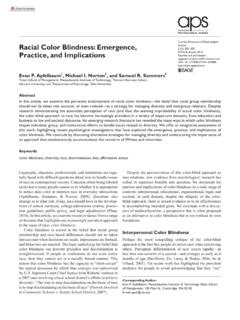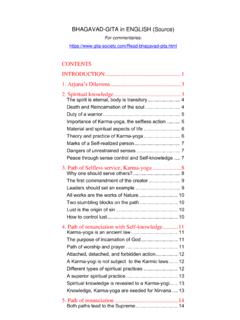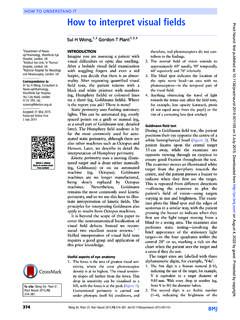Transcription of THE IMPACT OF ‘GLOBALIZATION’ ON CULTURAL IDENTITIES
1 THE IMPACT OF GLOBALIZATION ON CULTURAL IDENTITIESPEDRO MORAND COURT1. FOREWORDThe purpose of this contribution is to analyze the IMPACT that the ongo-ing globalization process has on the CULTURAL IDENTITIES of peoples. However,to be able to carry out this analysis it is first necessary to locate the processof globalization within the realm of understanding culture, somethingwhich is usually not done. The commonly used definition of globalizationcomes from the economic realm, from the opening up to free trade andfrom the growing interdependence of world markets at their different lev-els. To this definition is usually added the political and institutional dimen-sion, the responsibility of the organisms of the United Nations, multilater-al pacts, and regional agreements.
2 In both dimensions there exist, certain-ly, involved CULTURAL aspects: the so-called CULTURAL industry and show busi-ness on the one hand, and CULTURAL institutions protected by law, such asschools, universities and the media, on the other. However, with anapproach of this type we only touch the surface of the CULTURAL dimension,since this last cannot be reduced either to the exchange of products or toinstitutions. Therefore, I would like to analyze at the outset what I under-stand as culture from the perspective of sociology and how the process ofglobalization can be defined using this THECONCEPT OFCULTUREI leave to philosophers the analysis of the ontological dimension of cul-ture and its relationship with the human person as such.
3 I make this indis- Globalization. Ethical and Institutional Concerns Pontifical Academy of Social Sciences, Acta 7, Vatican City 2001 pensable explanation because I do not ignore the fact that the currentPontiff s teaching provided beautiful stimuli for reflection when he declaredin his speech to UNESCO that culture is a specific way of existing and ofman s being ; that man, who in the visible world is the only ontic subject ofculture, is also its only object and its end and that one cannot think of cul-ture without human subjectivity and without human causation; that, in thefield of culture, man is always the first fact: man is the primordial and fun-damental fact of culture. And this is man always in his/her entirety: in theintegral whole of his/her spiritual and material subjectivity (Speech toUNESCO, 2 June 1980).
4 Globalization , as such, is not a phenomenon thatin an immediate or direct way bears upon this sphere of analysis. Rather, itpresupposes it, at least in the sense that the human person rationally under-stands that in spite of his or her different ethnic and historical- CULTURAL ori-gins he or she shares that same rational condition which makes him or heraware that he or she is a free subject and also conscious of the causation ofhis or her acts, something which includes, as a consequence, his or herresponsibility. Although voices have already been raised which seek to ques-tion the unity of the human species and also question that all men, by thefact of being such, must be considered as persons, that is to say free fellowsand equal in dignity and rights, it is my view that their arguments are exces-sively directed towards the legitimation of dubious techniques which allowthe manipulation of human beings and as a result these voices do notexpress effective rational arguments.
5 Sociology, in a more modest perspective, considers the concept of cul-ture as a historical one which was consolidated in Europe during the eigh-teenth century after a long social genesis and which since then has not onlybeen applied in the European regions but progressively throughout theworld. This is not the place to describe the most relevant aspects of thissocio-genesis. It is enough to point out that it has been, so to speak, an evo-lutionary gain in terms of the achievement of objectivity in observing socialphenomena, with the consequent possibility of comparing different partic-ular traditions and customs, and this at a time when with the massificationof written culture the consideration of social esteem was liberated from avision derived from the higher levels of a pyramid made up of status hier-archization.
6 After the consolidation of bourgeois culture, what was culti-vated could be considered in alternative ways and from a perspective dif-ferent to that of the nobility. But this was only the beginning of a processthat was to be enlarged progressively to other spheres. Not only would lifeand death, catastrophe and illness, be perceived as constituent elements ofPEDRO MORAND COURT190 THE IMPACT OF GLOBALIZATION ON CULTURAL IDENTITIES191human contingency: they would begin to be defined with suitable and rel-evant social approaches. The concept of culture expressed the possibility that social differencecould be considered in symmetrical form and not only with those conceptswhich, due to the ontological load involved, hierarchize one of the two sidesof the differentiated: truth/falsehood, good/evil, beauty/ugliness, civiliza-tion/barbarity, nobility/ignobility.
7 If, during the sixteenth century, for exam-ple, theologians had to pose the question of whether the recently discoveredAborigines of America were really humans at all, thereafter the concept thatwas employed was that of other cultures , without there being an explicitindication through such an appellation of any form of hierarchy. One wasdealing, simply, with otherness. Obviously enough, the hierarchization ofdifference would not disappear completely, and this is true of our days aswell. But ethnocentrism, racism and other tendencies of this type began tobe easily known as particular points of view which did not depend on theobjects being observed but on the perspectives of the observers. Following Luhmann, we can affirm, in consequence, that the conceptof culture expressed an observation of the second degree, that is to say, theobservation made by observers.
8 There do not exist, as such, CULTURAL objectswhich can be differentiated from others that are not such objects. Not eventhe difference between natural objects and constructed devices is an exam-ple of this because all cultures have given to natural objects varied symbol-ic meanings that can be understood only with reference to their hermeneu-tic presuppositions. As was to be expressed later in the classic definition byTylor, practically all objects that have social meaning belong to culture. It isnot, therefore, from the object in itself that we can construct a culturalanalysis, but from the way in which that object is observed by observers. What lies behind this observation of the second degree? Fundamentally,two things. Firstly, the self-observation that is structured in the conscious-ness starting with the differentiation between identity and difference, thatis to say, between self-reference and hetero-reference.
9 Secondly, the discov-ery of the blind point present in every observation produced by the fact thatwhen tracing a difference no observer can be located simultaneously onboth sides of the differentiated. When discovering the blind point in others,awareness of one s own blind point can be acquired and hence the need tomake comparisons between the different points of view, which in turn feedback to the perception of identity and difference. This is the procedure bywhich different peoples have acquired CULTURAL identity, either in their iden-tity/difference in relation to their immediate neighbors or in relation tomajor regions of the earth: for example, the West/the East, the North/theSouth, Ibero-America/Anglo-America, Latinity/Germanity, etc.
10 The sameapproach is usually applied within societies with reference to sex, age,income, productivity or any other socially relevant aspect. There are as many types of cultures as there are points of view fromwhich cultures can be observed and differentiated. If in certain circum-stances one prevails over another, this is the result of the social relevanceattributed to these differentiations, which can be recomposed and fed backinfinitely. Observing this process from the perspective of social evolution, itcould be said that without abandoning them totally, approaches linked tothe ontic reality of people, such as sex, age, race, and territory, are substi-tuted for contingent and relative criteria for the purpose of observation, suchas productivity, efficiency, speed, objectivity, esteem, and subjective prefer-ences.








